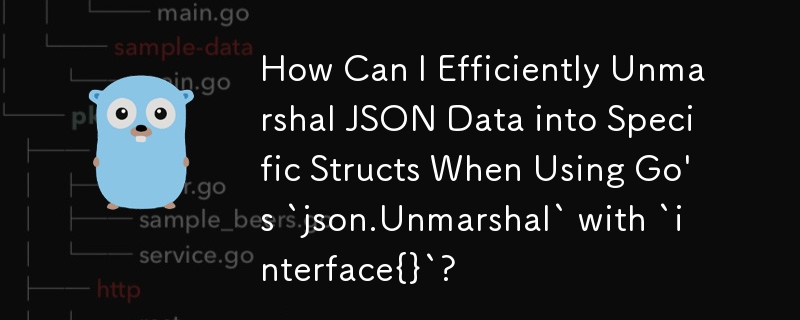當使用 Go 的 `json.Unmarshal` 和 `interface{}` 時,如何有效地將 JSON 資料解組到特定的結構中?
- Mary-Kate Olsen原創
- 2024-12-26 13:44:10474瀏覽

解碼為Interface{} 和型別斷言
問題陳述
使用Go 的json.Unmarshal 解碼字串時從訊息系統中發現結果是map[string]interface{}而不是預期的結構類型(Somthing1 或Somthing2),使得型別斷言不可能。
根本原因
json.Unmarshal 函數,當解組到介面{}時,預設值已知類型,如[]interface{} 和map[string ]interface{}。在給定的程式碼中,介面變數輸入接收表示未編組的 JSON 資料的 map[string]interface{},但 switch 語句嘗試直接將其斷言為 Somthing1 或 Somthing2。
解決方案
由於JSON 本身並未解組到所需的結構中,因此有兩個選項可以解決此問題問題:
1。從通用映射中檢查和轉換:
一種方法是檢查 map[string]interface{} 並手動將資料解包到適當的結構類型中。但是,這需要仔細處理潛在錯誤並手動分配值。
2.使用自訂 JSON 解組器:
更簡潔的解決方案是建立自訂 JSON 解組器來處理解群組流程。此自訂解組器可以根據 JSON 資料識別正確的結構類型並相應地對其進行解組。以下是此類解組器的範例:
type Unpacker struct {
Data interface{}
}
func (u *Unpacker) UnmarshalJSON(b []byte) error {
smth1 := &Something1{}
err := json.Unmarshal(b, smth1)
// no error, but we also need to make sure we unmarshaled something
if err == nil && smth1.Thing != "" {
u.Data = smth1
return nil
}
// abort if we have an error other than the wrong type
if _, ok := err.(*json.UnmarshalTypeError); err != nil && !ok {
return err
}
smth2 := &Something2{}
err = json.Unmarshal(b, smth2)
if err != nil {
return err
}
u.Data = smth2
return nil
}
透過將此自訂解組器的實例傳遞給json.Unmarshal,產生的Data 欄位將包含正確結構類型的解組數據,從而允許無縫類型斷言.
以上是當使用 Go 的 `json.Unmarshal` 和 `interface{}` 時,如何有效地將 JSON 資料解組到特定的結構中?的詳細內容。更多資訊請關注PHP中文網其他相關文章!
陳述:
本文內容由網友自願投稿,版權歸原作者所有。本站不承擔相應的法律責任。如發現涉嫌抄襲或侵權的內容,請聯絡admin@php.cn

